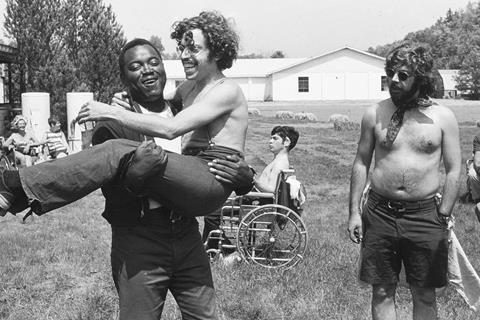Inspirational, moving documentary about a revolutionary 1970s summer camp for children with disabilities

Dirs. Nicole Newnham, Jim LeBrecht. US. 2019. 102 mins.
Crip Camp, which opens the US Documentary Competition at this year’s Sundance Film Festival (in advance of its Netflix release in March) is an enlightening and inspirational look at the disabled rights movement of the 1970s in the US, tracked through a revolutionary summer camp for children with disabilities. Yet it is also a viewing experience tinged with some sadness. Almost a half century later, it seems clear even to the most unenlightened observer that current society isn’t where these exceptional young people, and eventual adults, pushed so mightily to take us. A home on Netflix, where it should be widely viewed, will be the best way to ensure that Crip Camp reminds the world how access still needs to be urgently addressed. (And not least within the entertainment industry itself.)
While the structure of the documentary is classic, what transpires is anything but expected
Directed in broad brush strokes by Nicole Newnham and one of the film’s main anchoring voices Jim LeBrecht, and executive produced by the Obamas through their Higher Ground label, Crip Camp boasts some astonishing footage of the Jened camp itself; creamy black and white video shot in the Catskills site over two summers by the Peoples’ Video Theater project. This has clearly prompted the re-telling of this incredible story, framed around the surviving residents – including disability activist LeBrecht – who share their experiences.
That these idealistic teenagers went on to form the vanguard of the radical disabled rights movement makes the viewer thirst for more detail as to how Jened was set up and run than Crip Camp clearly wants to give us; this documentary wants us to look, not read. Yet the result is galvanising: what they achieved against such high physical odds is a salutary lesson in these more cynical times.
While the structure of the documentary is classic, what transpires is anything but expected. We watch the over-exposed video footage from the camp in 1971, introduced at the outset by LeBrecht, a boy born with no legs who had, unusually, been granted access to mainstream schooling in his native New York. “I wasn’t a shut-in,” he explains, referring to the disabled children who were dumped in appalling institutions such as the controversial Willowbrook, some of whom attended Jened. Access to mainstream education was limited for the disabled back then and even if they did go to school, they were segregated. Jimmy wanted to be part of his own peer group, to have a girlfriend, to be in this place – “a summer camp for the handicapped run by hippies” – where there was no outside world.
Footage is surprising, and, occasionally heart-breaking; not because of the disabilities onscreen, but because it recalls the idealism of the 1970s, long since gone. The intake of counsellors and children is determinedly multi-racial – one black counsellor remembers identifying with the children because he too was shut out of society in his native Alabama. Indeed, when the disabled protestors would later stage a lengthy sit-in at government offices to push for equal access, the Black Panthers would come to feed them.
Health and Safety issues of today seem non-existent: the dorms at Jened were as messy as any teenager’s, while hippies bundled kids over their shoulders and raced them around in wheelchairs. How some of the paraplegic inmates with, for example, severe cerebral palsy were attended to is one of the questions the documentary doesn’t quite address. There’s only fleeting footage of one “adult-in-charge”, the camp director Larry Allison, but no real reference is made to its establishment (in 1951) or closure (in 1977, due to financial issues – it can’t have been cheap). That might have better grounded the film.
Perhaps, though, it’s also for the best, as the burning desires of these children light up the screen. Judy Heumann, at the cutting edge of the movement later on in the decade, is shown as a sparky teenager doing what she would later accomplish to devastating effect: building a consensus amongst the disabled and their allies to effect change. On this occasion, lasagne for dinner; later it would be pushing through a US bill of rights.
Crip Camp goes on to track the disability rights movement and its setbacks and achievements, all the time wheeling back to Jened in 1971 and 1972 for reference and an understanding of how the seeds of rebellion were sown. It’s quite a tale, one that’s refreshingly frank – or its participants are – on the subject of sex. The emotions raised by the film are mixed: respect and awe for the people on screen; disappointment that society has continued to pedal back on their hard-won rights. But perhaps the most important idea that Crip Camp illustrates is how society needed these kids and their radicalism more than they ever really needed it. And that’s an idea to move forward with.
Production companies: Higher Ground/Rusted Spoke
Contact: Netflix
Producers: Sarah Gordon, Jim LeBrecht, Nicole Newnham
Cinematographer: Justin Schein
Editing: Eileen Meyer, Andrew Gersh
Music: Bear McCreary















![[L-R]: Amanda Villavieja, Laia Casanovas, Yasmina Praderas](https://d1nslcd7m2225b.cloudfront.net/Pictures/274x183/6/4/1/1471641_pxl_20251224_103354743_618426_crop.jpg)








